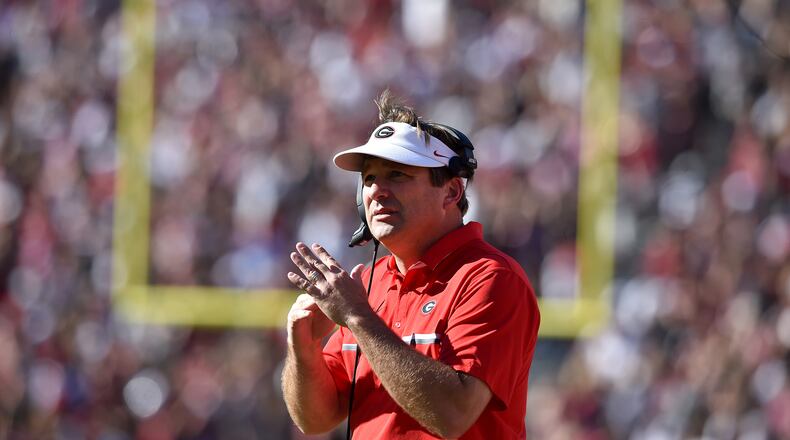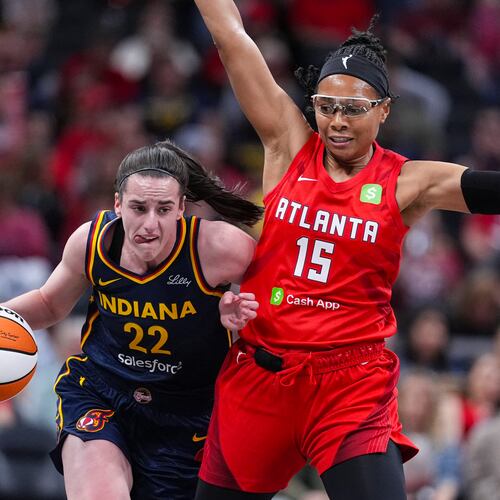There is a tendency in sports, as in life and mutant political races, to have every sudden development morph into a misguided absolute or a knee-jerk social-media narrative. Look no further than Georgia football as a microcosm of this universe:
Kirby Smart is struggling, so it’s clear Georgia made a mistake thinking it can do better than Mark Richt.
(Not necessarily.)
A new coach who can’t even get his team ready to play Nicholls State or Vanderbilt is obviously overmatched as a head coach.
(A bit premature.)
This proves yet again that former defensive coordinators make lousy head coaches.
(I’ll pass this gem along to Nick Saban. And Bill Belichick. And Don Shula.)
There is a lot of noise around the Georgia program. There should be. The Bulldogs are coming off a humiliating home loss to a two-touchdown underdog, Vanderbilt, and have lost three of their past four.
So they have drop-kicked any realistic chance of winning the SEC East even before the annual weekend of crushed dreams in Jacksonville.
It’s fair to have concerns about the Bulldogs in general and Smart in particular. But seven games into Smart’s first season is a little early for grand proclamations. His 4-3 start — while alarming given the Vandy game, the blowout at Ole Miss and the debacle against a bought-and-paid-for FCS opponent, Nicholls State — isn’t that dissimilar to the seven-game records of the previous seven six Georgia head coaches. Consider: Wally Butts 3-4; Johnny Griffith 3-4, Vince Dooley 4-2-1, Ray Goff 4-3, Jim Donnan 3-4, Mark Richt 5-2.
There is criticism. There is noise. There is a consensus in the dark corners of the social-media underworld that the house is on fire and that Smart is overmatched in his position. How does he deal with it?
“I don’t deal with it,” he said Tuesday. “I focus on us getting better. With this job comes criticism. I’ve accepted it. I’ve seen it. I’ve seen it with good friends and programs I’ve been in. That doesn’t scare me. What I’m worried about is our team and our players developing.”
Smart is new to sitting in the first chair, but he’s not new to this world. He a coach’s son. He has worked in major programs and the NFL, and for most of his career studied under one of the most intense and demanding coaches of all time: Nick Saban. So he understands what comes with the job and he doesn’t run from criticism.
“Welcome to the word we live in as coaches,” he said after referencing some of Georgia’s close losses this season. “There’s a lot of areas we’re going to improve on. But am I questioning myself? No. You have to look at what you’re doing and see if there’s a better way, but everyone is doing that.”
Unless Smart wins SEC titles and elevates Georgia to that of serious national championship contender, it will forever be debated whether the administration made the correct decision to fire Richt. That’s fair. But those who were in the camp that the Bulldogs had hit a ceiling under Richt shouldn’t be making a U-turn now. Even in the worst-case scenario, with the program crash-and-burning under Smart, it wouldn’t mean Georgia was wrong to move on from Richt. It would mean only that the school picked the wrong replacement.
It’s fair to question and wonder how a coaching staff can blow timeout situations, or have plays with 10 or 12 players on the field, or allow a 95-yard kickoff return to open a game, or rank 13th in the SEC and 97th nationally in penalties per game, or not give the ball to Nick Chubb on fourth-and-1. But that doesn’t scream what the finish line looks like.
Smart isn’t Saban. He likely never will be Saban. But how did even Saban look when he lost to Louisiana-Monroe, finished 6-6 and wound up in Shreveport in his first season at Alabama in 2007?
At that point in time, Alabama was a punchline, not a blueprint that everybody wanted to follow.
Georgia looked like a pretty good team against North Carolina (which has won five of six since, including victories at Florida State and at Miami). It had some promising moments at Missouri and South Carolina and even in the loss to Tennessee. This is a team that can run the table in the last five weeks … or fall off its chair.
Smart said he self-evaluates, but he hasn’t changed his message or his agenda. He harps on players to improve but, “We also tell kids all the time, it’s not them, it’s us.”
Specifically, it’s him. Because when a team doesn’t improve, it ultimately falls on the head coach. It’s just too early to assume how this ends.
Subscribe to the new, “We Never Played The Game” podcast on iTunes with Jeff Schultz and WSB’s Zach Klein. New episodes every Monday and Thursday.
About the Author
Keep Reading
The Latest
Featured


